Resource Library Resource Library
Printables Printables
Infographics Infographics
3 Ways to Maximize EL Student Learning in Group Work
Questions for Self-Assessment with Expert “Do’s and Don’ts”
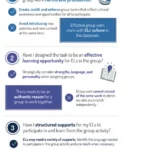
This infographic shares the do’s and don’ts of EL group work and provides three key self-reflection questions to help you reflect on and refine your teaching strategy.
Download

This infographic shares the do’s and don’ts of EL group work and provides three key self-reflection questions to help you reflect on and refine your teaching strategy.
Download
5 Strategies to Position English Learners for Success
SupportEd’s Top 5 Strategies to Position ELs for Success This Year
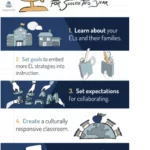
Whether you’re a content, ESOL, bilingual teacher or administrator, this infographic will help you refine classroom strategy and position your ELs for success in the upcoming school year.
Download

Whether you’re a content, ESOL, bilingual teacher or administrator, this infographic will help you refine classroom strategy and position your ELs for success in the upcoming school year.
Download
10 Keys for Developing an English Learner Master Plan
SupportEd’s 10 Key Components to EL Master Plan DevelopmentpportEd’s Tips in Response to Educators’ Questions
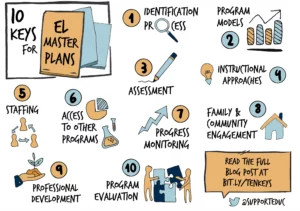
EL Master Plans bring together the necessary elements of EL education: high-quality standards, effective instructional principles, assessment, research, and professional development. We drew from our experience in EL Master Plan development to share our ten keys and provide a roadmap for supporting your ELs in reaching their full academic potential. Click here to read our full 10 Keys for Developing an EL Master Plan blog post.
Download

EL Master Plans bring together the necessary elements of EL education: high-quality standards, effective instructional principles, assessment, research, and professional development. We drew from our experience in EL Master Plan development to share our ten keys and provide a roadmap for supporting your ELs in reaching their full academic potential. Click here to read our full 10 Keys for Developing an EL Master Plan blog post.
Download
Creating a Welcoming Environment for ELs and Their Families
A Checklist for Schools
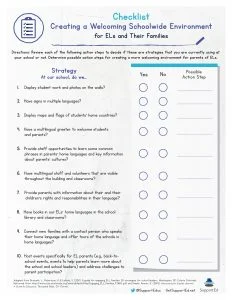
Use this checklist to reflect on and evaluate steps you and your colleagues take to create a welcoming environment for EL students and their families. Once you have assessed your current practices, set goals for shaping and maintaining a more welcoming environment within your school.
Download

Use this checklist to reflect on and evaluate steps you and your colleagues take to create a welcoming environment for EL students and their families. Once you have assessed your current practices, set goals for shaping and maintaining a more welcoming environment within your school.
Download
Equitable EL Grading Infographic
The 5 Pillars of Equitably Grading ELs Infographic
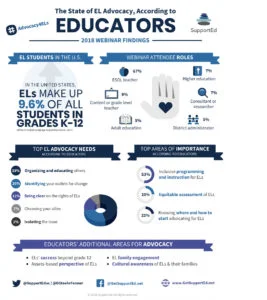
This infographic provides insight into nationwide EL grading challenges as well as expert suggestions to address common issues with EL grading in your contexts.
Download

This infographic provides insight into nationwide EL grading challenges as well as expert suggestions to address common issues with EL grading in your contexts.
Download
Four Practices for Fostering ELs’ Oral Language Development
Practices to Engage ELs in Academic Conversations and Encourage Oral Language Development
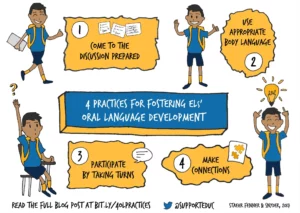
Despite the proven benefits of academic conversations, many ELs are still provided insufficient opportunities to engage in oral language activities and often remain largely silent during instruction. This sketch note proposes four practices to foster greater EL engagement and participation in academic conversations. Click here to read our corresponding blog post that details each practice and provides examples.
Download

Despite the proven benefits of academic conversations, many ELs are still provided insufficient opportunities to engage in oral language activities and often remain largely silent during instruction. This sketch note proposes four practices to foster greater EL engagement and participation in academic conversations. Click here to read our corresponding blog post that details each practice and provides examples.
Download
Making Text Accessible to ELs Infographic
May 2019 Webinar Findings and SupportEd’s Tips in Response to Educators’ Questions
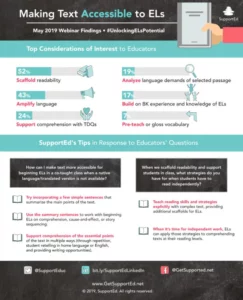
This infographic shares insights into nationwide challenges of making text accessible to ELs and strategies for making complex text more accessible to our ELs.
Download

This infographic shares insights into nationwide challenges of making text accessible to ELs and strategies for making complex text more accessible to our ELs.
Download
Overcoming Barriers to EL Family Engagement
4 Steps to Removing Obstacles and Fostering Greater EL Family Engagement
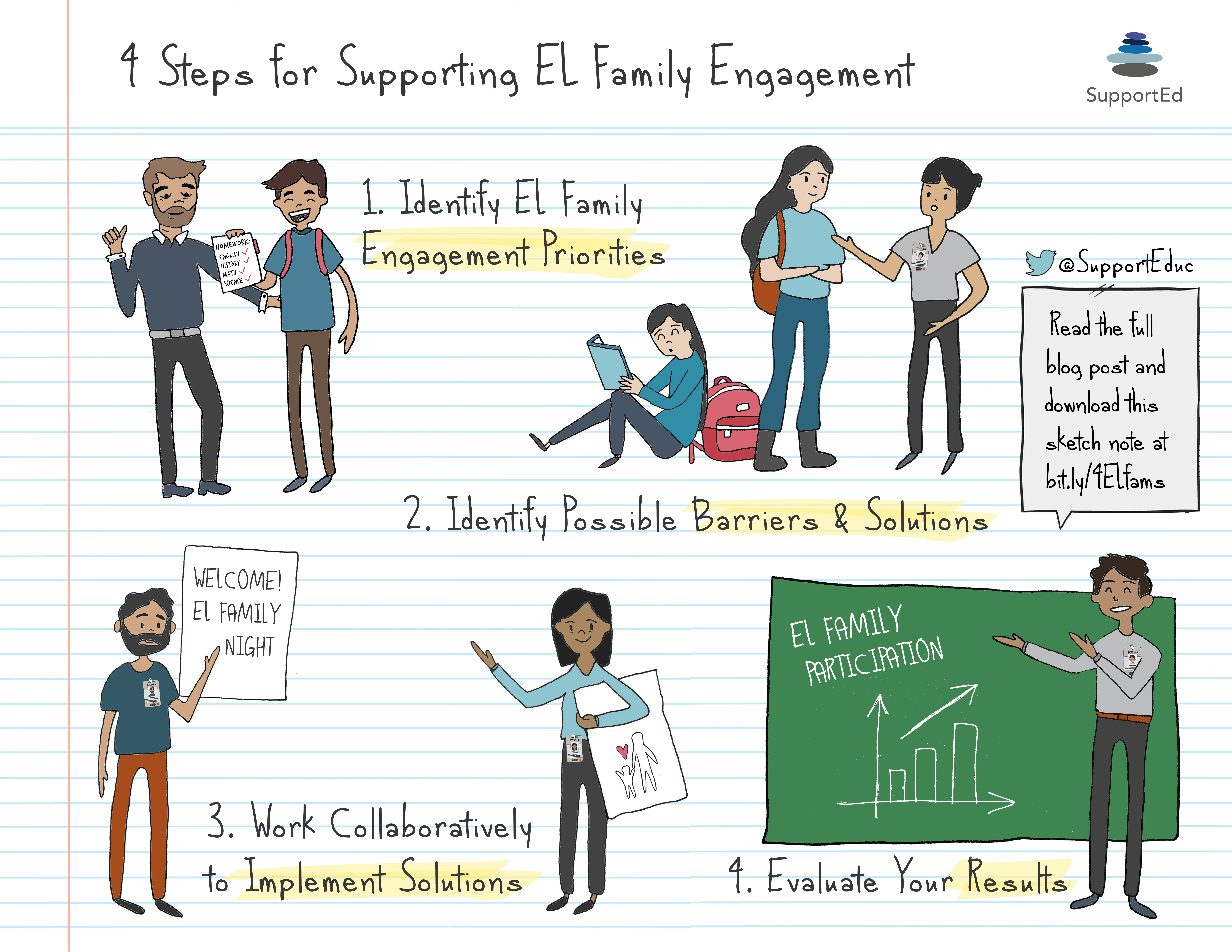
We know family engagement plays a key role in supporting our ELs and setting them up for success. This sketch note shares four steps to overcoming common family engagement barriers and fostering stronger relationships with EL families. Click here to read our corresponding blog post that discusses why family engagement matters, what it looks like, and steps you can take to overcome obstacles that might be preventing EL family participation in your school.
Download

We know family engagement plays a key role in supporting our ELs and setting them up for success. This sketch note shares four steps to overcoming common family engagement barriers and fostering stronger relationships with EL families. Click here to read our corresponding blog post that discusses why family engagement matters, what it looks like, and steps you can take to overcome obstacles that might be preventing EL family participation in your school.
Download
The State of EL Advocacy Infographic
The State of EL Advocacy, According to Educators Infographica

This infographic provides insight into nationwide EL advocacy challenges and suggestions to address common advocacy issues in your contexts.
Download

This infographic provides insight into nationwide EL advocacy challenges and suggestions to address common advocacy issues in your contexts.
Download
Supporting English Learners’ Oral Language Development
SupportEd’s Tips to Support ELs’ Oral Language Development Through Academic Conversations
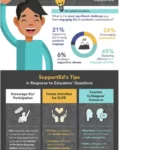
This infographic shares insights into nationwide challenges of EL oral language development and strategies to increase EL support in academic conversations.
Download

This infographic shares insights into nationwide challenges of EL oral language development and strategies to increase EL support in academic conversations.
Download
Supporting Undocumented Students Applying to College
4 Advocacy Steps
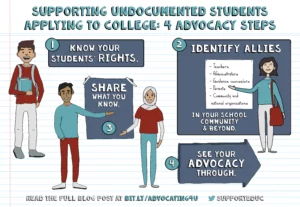
There is still a great deal of confusion around undocumented students applying to college and the added layer of complications they face, and applying to college is stressful enough without being undocumented. As educators, we owe it to our students to help them navigate this complicated and murky process. This sketch note shares four steps you can take to support undocumented students who want to apply to college. You can also click here to read our corresponding blog post.
Download

There is still a great deal of confusion around undocumented students applying to college and the added layer of complications they face, and applying to college is stressful enough without being undocumented. As educators, we owe it to our students to help them navigate this complicated and murky process. This sketch note shares four steps you can take to support undocumented students who want to apply to college. You can also click here to read our corresponding blog post.
Download
Three Strategies for Promoting ELs’ Assets
Shifting from a Deficit to an Assets-Based Disposition
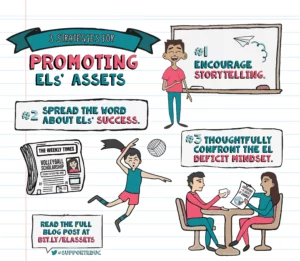
Engaging in an assets-based approach with ELs requires a shift in our thinking. We must shift from what we believe is lacking in our students in order to recognize and promote the strengths and assets they already possess and contribute to their classrooms. This sketch note shares three replicable ways to better promote ELs’ assets within your school; you can also click here to read our corresponding blog post that details each suggestion and discusses the importance in shifting from a deficit to an assets-based disposition.
Download

Engaging in an assets-based approach with ELs requires a shift in our thinking. We must shift from what we believe is lacking in our students in order to recognize and promote the strengths and assets they already possess and contribute to their classrooms. This sketch note shares three replicable ways to better promote ELs’ assets within your school; you can also click here to read our corresponding blog post that details each suggestion and discusses the importance in shifting from a deficit to an assets-based disposition.
Download
Ways to Make Text More Accessible to ELs
6 Steps to Consider When Supporting ELs in Accessing Complex Texts
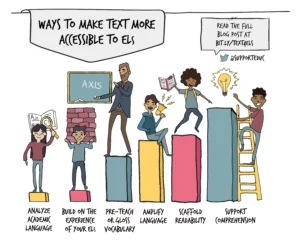
Making text accessible to our ELs can be quite the challenge, and finding a starting point can be even more difficult. Are you leveraging strategies and resources to maximize support and provide your ELs an equitable education experience? This sketch note share six steps to consider when supporting ELs in accessing complex, grade level text. Click here to read our corresponding blog post that details each step and explores specific examples to help support your ELs in accessing the texts you choose.
Download

Making text accessible to our ELs can be quite the challenge, and finding a starting point can be even more difficult. Are you leveraging strategies and resources to maximize support and provide your ELs an equitable education experience? This sketch note share six steps to consider when supporting ELs in accessing complex, grade level text. Click here to read our corresponding blog post that details each step and explores specific examples to help support your ELs in accessing the texts you choose.
Download
Checklists
Checklists
Academic Language Awareness Checklist
A Checklist for Increasing Academic Language Awareness
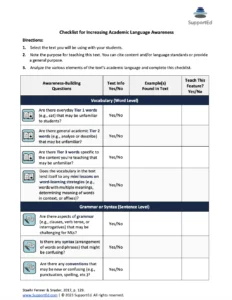
Understanding and applying academic language is at the heart of EL language development and mastery of grade-level content, and providing ELs the support they deserve is crucial in fostering academic comfortability and growth. Framed around a set of awareness-building questions, our “Academic Language Awareness Checklist” provides practical considerations to help analyze academic language and discover new strategies for strengthening EL text comprehension.
Download

Understanding and applying academic language is at the heart of EL language development and mastery of grade-level content, and providing ELs the support they deserve is crucial in fostering academic comfortability and growth. Framed around a set of awareness-building questions, our “Academic Language Awareness Checklist” provides practical considerations to help analyze academic language and discover new strategies for strengthening EL text comprehension.
Download
Culturally Responsive School Checklist & Goal-Setting
Culturally Responsive School Checklist & Goal Setting
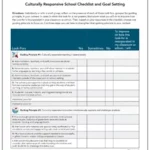
It’s always important to give ourselves permission to pause, catch our breath, and reflect. For us educators, even more so. Our Culturally Responsive School Checklist is a tool that can help you gauge how you are supporting and valuing your multilingual learners (MLs) and their families. It explores 26 “look for’s” organized by our 5 Guiding Principles of Culturally Responsive Teaching (Snyder & Staehr Fenner, 2021).
Download

It’s always important to give ourselves permission to pause, catch our breath, and reflect. For us educators, even more so. Our Culturally Responsive School Checklist is a tool that can help you gauge how you are supporting and valuing your multilingual learners (MLs) and their families. It explores 26 “look for’s” organized by our 5 Guiding Principles of Culturally Responsive Teaching (Snyder & Staehr Fenner, 2021).
Download
Culturally Responsive School Checklist
A Checklist for Culturally Responsive Instruction
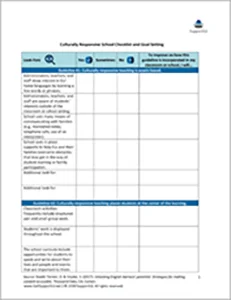
This checklist offers classroom and school look-fors in four areas that align to Staehr Fenner & Snyder’s (2017) four guidelines for culturally responsive instruction. We invite you and your colleagues to use this checklist as a collaborative tool to facilitate conversation around culturally responsive instruction in your school and set goals for improvement.
Download

This checklist offers classroom and school look-fors in four areas that align to Staehr Fenner & Snyder’s (2017) four guidelines for culturally responsive instruction. We invite you and your colleagues to use this checklist as a collaborative tool to facilitate conversation around culturally responsive instruction in your school and set goals for improvement.
Download
EL Formative Assessment Checklist
10 Considerations for Developing EL Formative Assessments
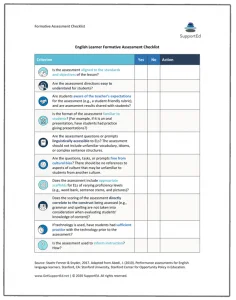
Formative assessments play a key role in measuring student mastery of new and challenging content, and all ELs deserve equal opportunities to demonstrate their academic achievement and growth. This checklist provides ten research-based considerations to help reflect on current practices and discover new strategies for developing effective assessments for ELs.
Download

Formative assessments play a key role in measuring student mastery of new and challenging content, and all ELs deserve equal opportunities to demonstrate their academic achievement and growth. This checklist provides ten research-based considerations to help reflect on current practices and discover new strategies for developing effective assessments for ELs.
Download
EL Formative Assessment Checklist for Distance Learning
10 Considerations for EL Formative Assessments for Distance Learning

Whether in a distance, hybrid, or in-person learning environment, formative assessments play a key role in measuring student mastery of new and challenging content, and all ELs deserve equal opportunities to demonstrate their academic achievement and growth. This checklist provides ten research-based considerations to help reflect on current practices and discover new strategies for developing effective assessments for ELs during distance learning.
Download

Whether in a distance, hybrid, or in-person learning environment, formative assessments play a key role in measuring student mastery of new and challenging content, and all ELs deserve equal opportunities to demonstrate their academic achievement and growth. This checklist provides ten research-based considerations to help reflect on current practices and discover new strategies for developing effective assessments for ELs during distance learning.
Download
Observation Checklist
12 Considerations for Scaffolding, Academic Language, and Oral Language Development
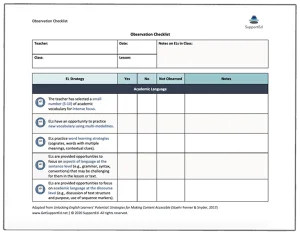
This checklist provides practical, research-based practices for scaffolding, academic language, and oral language development. It can be leveraged by administrators and educators for self-reflection, assessment, and peer observations; it may also be useful for strategic goal setting.
Download

This checklist provides practical, research-based practices for scaffolding, academic language, and oral language development. It can be leveraged by administrators and educators for self-reflection, assessment, and peer observations; it may also be useful for strategic goal setting.
Download
Scaffolded Lesson Planning Checklist
A Checklist for Incorporating Scaffolds into Instruction
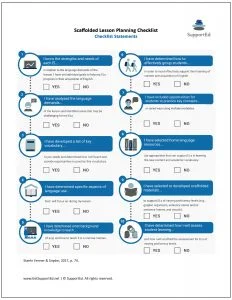
Helping your ELs thrive academically and personally requires more than knowing and selecting appropriate scaffolds. It’s important to think deeply about the best ways to incorporate those scaffolds into your instruction so you and your colleagues can set goals for encouraging EL success. Our “Scaffolded Lesson Planning Checklist” provides considerations and guidelines in doing so.
Download

Helping your ELs thrive academically and personally requires more than knowing and selecting appropriate scaffolds. It’s important to think deeply about the best ways to incorporate those scaffolds into your instruction so you and your colleagues can set goals for encouraging EL success. Our “Scaffolded Lesson Planning Checklist” provides considerations and guidelines in doing so.
Download
Scaffolded Lesson Planning Checklist
A Checklist for Incorporating Scaffolds into Instruction
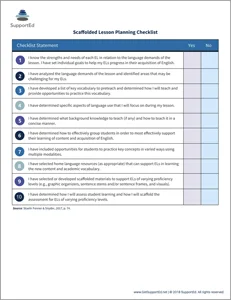
Helping your ELs thrive academically and personally requires more than knowing and selecting appropriate scaffolds. It’s important to think deeply about the best ways to incorporate those scaffolds into your instruction so you and your colleagues can set goals for encouraging EL success. Our “Scaffolded Lesson Planning Checklist” provides considerations and guidelines in doing so.
Download

Helping your ELs thrive academically and personally requires more than knowing and selecting appropriate scaffolds. It’s important to think deeply about the best ways to incorporate those scaffolds into your instruction so you and your colleagues can set goals for encouraging EL success. Our “Scaffolded Lesson Planning Checklist” provides considerations and guidelines in doing so.
Download
Guides
Guides
5 Pillars of Equitably Grading ELs
Resources for Equitably Grading ELs
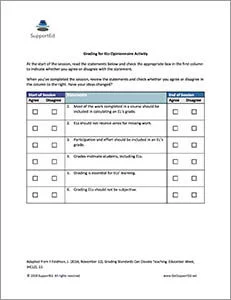
This bundle of three resources offers original, practical tools to help support you as you work towards the equitable grading of ELs.
Download

This bundle of three resources offers original, practical tools to help support you as you work towards the equitable grading of ELs.
Download
Advocating for English Learners PLC and Book Study Questions
Questions to Facilitate Educators’ Discussions of the Book
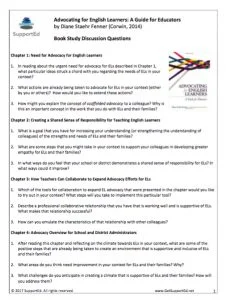
Many school districts are using Diane Staehr Fenner’s book Advocating for English Learners: A Guide for Educators as a foundation for their book study or Professional Learning Community (PLC). To help guide educators’ discussions around the topics in this book, we’ve designed discussion questions framed around the book’s chapters. We encourage you to download this useful list of questions and launch your own groups to focus on advocating for English Learners.
Download

Many school districts are using Diane Staehr Fenner’s book Advocating for English Learners: A Guide for Educators as a foundation for their book study or Professional Learning Community (PLC). To help guide educators’ discussions around the topics in this book, we’ve designed discussion questions framed around the book’s chapters. We encourage you to download this useful list of questions and launch your own groups to focus on advocating for English Learners.
Download
Categories of Scaffolds and Examples
Three Main Categories of Scaffolds for Your ELs
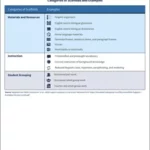
Once you have a foundation of EL scaffolds, it’s important to consider different scaffolding categories to maximize the ways in which your ELs can benefit. Use our “Categories of Scaffolds and Examples” graphic to break down the three main categories of EL scaffolds and incorporate some of our examples into your instruction.
Download

Once you have a foundation of EL scaffolds, it’s important to consider different scaffolding categories to maximize the ways in which your ELs can benefit. Use our “Categories of Scaffolds and Examples” graphic to break down the three main categories of EL scaffolds and incorporate some of our examples into your instruction.
Download
Cyber Learning Environments for ELs
Two Types of Cyber Learning Environments for ELs At-A-Glance
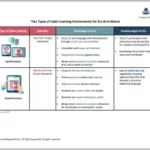
The temporary closure of brick and mortar schools is worldwide, unprecedented, and ongoing. Teachers are called to quickly figure out how to educate students in a distance learning environment, and the disruption and confusion experienced by all students may be compounded exponentially for ELs and their families. This resource shares the two types of cyber learning environments–synchronous and asynchronous–and considerations for EL distance learning.
Download

The temporary closure of brick and mortar schools is worldwide, unprecedented, and ongoing. Teachers are called to quickly figure out how to educate students in a distance learning environment, and the disruption and confusion experienced by all students may be compounded exponentially for ELs and their families. This resource shares the two types of cyber learning environments–synchronous and asynchronous–and considerations for EL distance learning.
Download
Creating a Welcoming Environment for English Learners (ELs) and Their Families
A Checklist for Schools
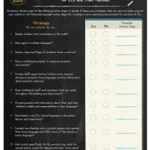
This checklist is a tool that you can use to evaluate the steps your school is taking to make ELs and their families feel welcome. Once you have assessed what you are currently doing, you can set goals for creating a more welcoming environment at your school.
Download

This checklist is a tool that you can use to evaluate the steps your school is taking to make ELs and their families feel welcome. Once you have assessed what you are currently doing, you can set goals for creating a more welcoming environment at your school.
Download
Formative Assessment Choice Board
Tic-Tac-Toe Formative Assessment Choice Board
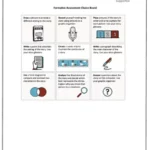
Now more than ever, we recognize the sense of urgency around assessment and equity as many ELs continue navigating distance learning. Our tic-tac-toe Formative Assessment Choice Board provides a variety of task options for ELs to demonstrate their understanding of content and increase assessment validity. Tailor tasks to ELs’ proficiency levels, strengths, and needs, provide different boards for different students, and embed appropriate scaffolds for tasks.
Download

Now more than ever, we recognize the sense of urgency around assessment and equity as many ELs continue navigating distance learning. Our tic-tac-toe Formative Assessment Choice Board provides a variety of task options for ELs to demonstrate their understanding of content and increase assessment validity. Tailor tasks to ELs’ proficiency levels, strengths, and needs, provide different boards for different students, and embed appropriate scaffolds for tasks.
Download
Possible Barriers to EL Family Engagement and Solutions
Possible Barriers to EL Family Engagement and Solutions
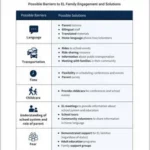
This tool offers six possible barriers to EL family engagement and solutions. We invite you and your colleagues to use this tool to facilitate conversation around shaping a welcoming environment for EL students and their families.
Download

This tool offers six possible barriers to EL family engagement and solutions. We invite you and your colleagues to use this tool to facilitate conversation around shaping a welcoming environment for EL students and their families.
Download
Reflection Tool for ELs Returning to School in 2020
Five Areas of Considerations for the Upcoming School Year
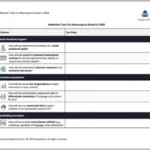
After an unexpected pivot to distance learning, teachers are now starting to look ahead and plan for what the instruction of ELs might look like this fall. This tool will help you reflect on five areas that are crucial for ELs in the upcoming school year and can be leveraged by educators providing distance learning exclusively, face-to-face instruction with social distancing, or a combination of both practices.
Download

After an unexpected pivot to distance learning, teachers are now starting to look ahead and plan for what the instruction of ELs might look like this fall. This tool will help you reflect on five areas that are crucial for ELs in the upcoming school year and can be leveraged by educators providing distance learning exclusively, face-to-face instruction with social distancing, or a combination of both practices.
Download
Suggested Scaffolds at Each Proficiency Level
Guidelines for Selecting the Right Scaffolds for Your ELs
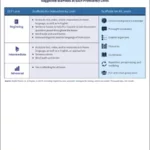
All teachers who work with ELs need strategies and tools to support ELs in accessing challenging content and acquiring academic language. Our “Suggested Scaffolds at Each Proficiency Level” tool makes it easy to select appropriate scaffolding based on English language proficiency levels (ELP) so you can establish a framework for mapping your scaffolds to students’ ELP level.
Download

All teachers who work with ELs need strategies and tools to support ELs in accessing challenging content and acquiring academic language. Our “Suggested Scaffolds at Each Proficiency Level” tool makes it easy to select appropriate scaffolding based on English language proficiency levels (ELP) so you can establish a framework for mapping your scaffolds to students’ ELP level.
Download
What I Know About My EL
A Guide for Learning About Your EL Students

Use this tool to help you and your colleagues expand knowledge and leverage valuable information about your EL students. Explore items such as home languages, educational experiences, family backgrounds, and more to better understand each student and support their success within and beyond the classroom.
Download

Use this tool to help you and your colleagues expand knowledge and leverage valuable information about your EL students. Explore items such as home languages, educational experiences, family backgrounds, and more to better understand each student and support their success within and beyond the classroom.
Download
